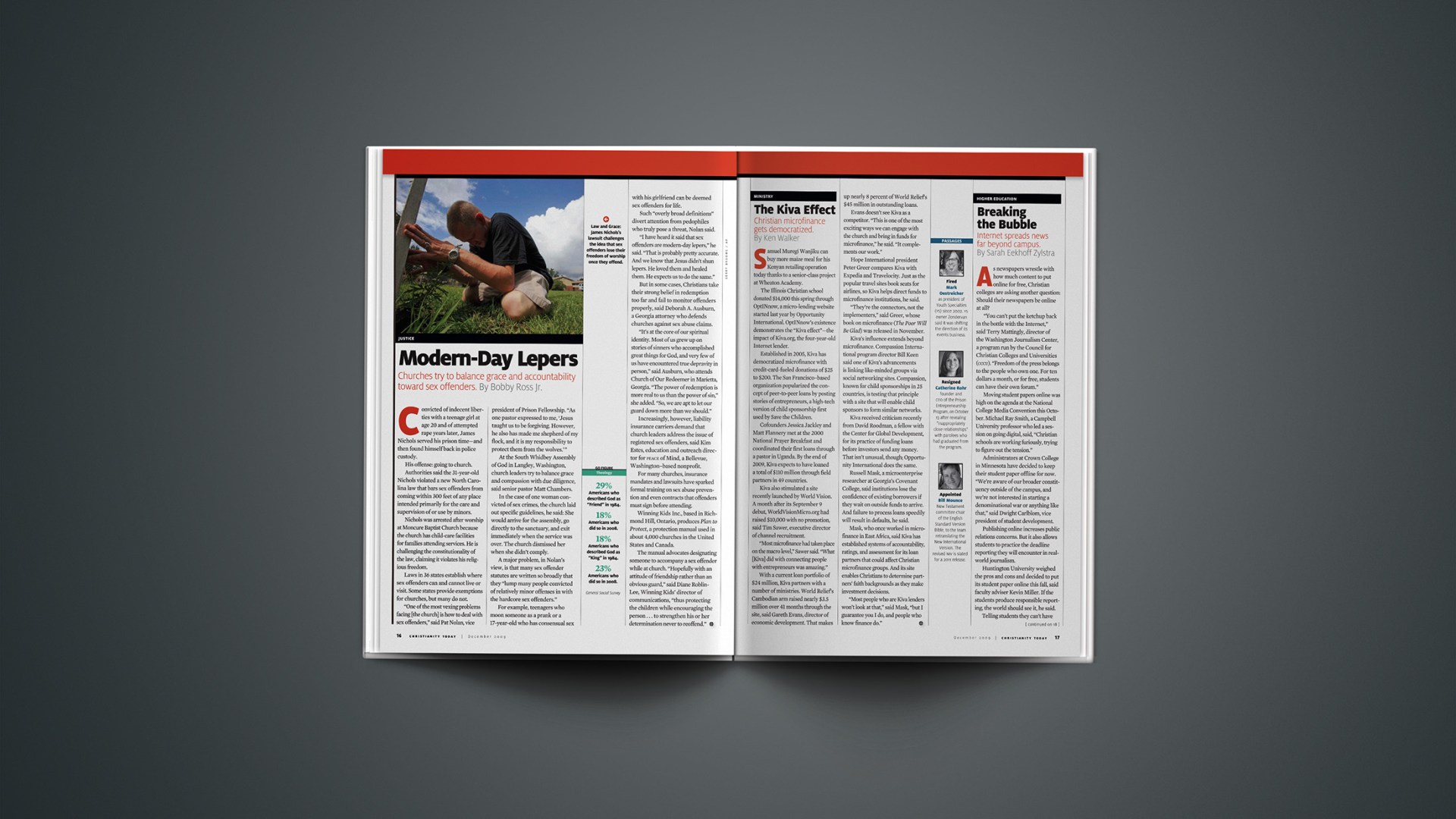As newspapers wrestle with questions about how much of their content to put online for free, Christian college newspapers are asking another question: Should they be online at all?
“You can’t put the ketchup back in the bottle with the Internet,” said Terry Mattingly, director of the Washington Journalism Center, a program run by the Council for Christian Colleges and Universities (CCCU). “Freedom of the press belongs to the people who own one. For ten dollars a month, or for free, students can have their own forum.”
Moving student papers online was high on the agenda at the National College Media Convention this October in Austin, Texas. Michael Ray Smith, a Campbell University professor who led a session on going digital, said, “It’s definitely on the radar, and Christian schools are working furiously, trying to figure out the tension.”
Students are already taking big issues to the Web. At Calvin College in September, Chimes posted a story online about a controversial board memo banning faculty from gay advocacy. Westmont College’s Horizon liveblogged during last November’s campus fire that destroyed 20 percent of its buildings. And Cedarville University placed Cedars‘ website behind a password-protected firewall after campus controversy in 2008. (The website is now publicly accessible.)
Mattingly urges his students to publish online so they can practice immediate reporting.
“[Online reporting] has a much closer relationship to the world of journalism at the level of wire services and the Web than does a student paper that comes out every two weeks,” he said. “And it doesn’t cost you a red cent.”
But this makes administrators nervous, especially at colleges that don’t have strong journalism programs, Mattingly said. “It’s one thing when you have pieces of dead tree pulp handed around on your campus. The minute you put it online, you’re dealing with trustees, parents, donors, and potential students.”
The number of CCCU schools that take journalism seriously is about 20, Mattingly said, leaving about 75 schools that aren’t sure how to approach journalism as a craft.
Administrators at Crown College in Minnesota have decided to keep their student paper offline for now. “We want to give our students freedom to write their opinions and think through what they want to say,” said Dwight Carlblom, vice president of student development. “At the same time, we do have to be concerned. As a small Christian college, we’re aware of our broader constituency outside of the campus, and we’re not interested in starting a denominational war or anything like that.”
External communities can access password-free online student newspapers, a fact that increases public relations concerns, said Doug Tarpley, dean of fine arts and communication at Biola University. “It’s one thing to learn while writing an English paper that one teacher is going to read. There are [more] implications when you’re writing for a paper that the entire campus is going to read.” He said potential problems multiply when students get on the Web.
Journalism professors should help administrations understand that students must have a degree of freedom to practice their craft, said Tarpley. It is also important for schools to have a policy and governing board to negotiate issues when they do surface, he said.
Telling students they can’t have space on the school website won’t make the issue go away. Multiple free sites allow students to post their stories, and using them is “so easy it’s ridiculous,” said Kristina Webb, managing editor of the student newspaper at Palm Beach Atlantic University.
While Palm Beach Atlantic has an official webpage for its paper, the page has to be updated by the school’s webmaster. To gain control over the content and frequency of the postings, the students started their own blog last spring.
The school website greatly limited the paper’s capacity to post photos and video, Webb said. “You have to be able to expand yourself beyond the print media, to make yourself more marketable coming out of school.”
The move to the Web has been slow and cautious at Christian schools, where administrations worry about libel, unflattering articles, or unpredictable issues.
“We just went online this fall,” said Kevin Miller, faculty adviser for the student paper at Huntington University. “We had a working understanding with the printed paper that students operate independently and will check controversial articles with the adviser.” That policy stands for the online version, he said.
“It is something of self-censorship but in the end it has served, I think, to help the students be more responsible in their reporting without shutting them down,” Miller said.
The administration considered making the newspaper available only to members of the campus, Miller said. But they wanted alumni to be able to see it. “If it’s balanced, fair, and responsible reporting, wouldn’t it be better if it were open to the world?” he said.
Christian colleges need a plan, Mattingly said. Colleges will fail if they try to stop students from publishing online. “You hand it over to students who are interested in sarcasm, rumor, and both good and bad satire,” he said. “All of a sudden, perfectly serious stories on your campus are now breaking into your community primarily through satire.”
Copyright © 2009 Christianity Today. Click for reprint information.
Related Elsewhere:
Christianity Today has more articles on education.










